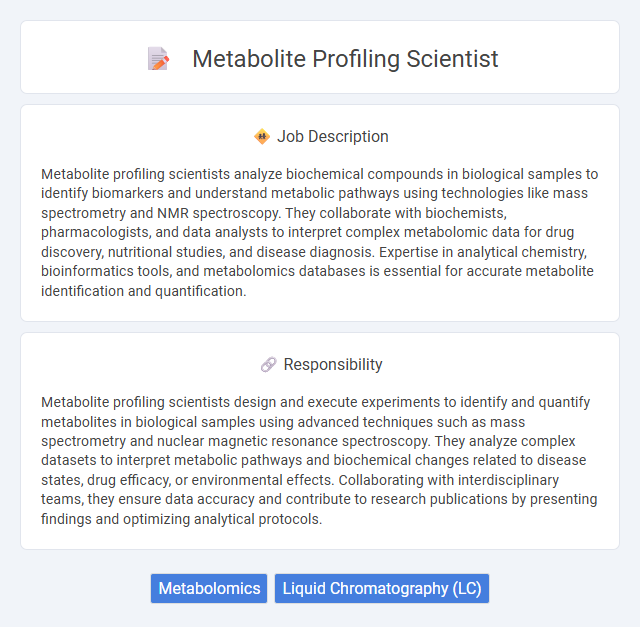
Metabolite profiling scientists analyze biochemical compounds in biological samples to identify biomarkers and understand metabolic pathways using technologies like mass spectrometry and NMR spectroscopy. They collaborate with biochemists, pharmacologists, and data analysts to interpret complex metabolomic data for drug discovery, nutritional studies, and disease diagnosis. Expertise in analytical chemistry, bioinformatics tools, and metabolomics databases is essential for accurate metabolite identification and quantification.
Individuals with a strong background in biochemistry and analytical chemistry are likely suitable for a metabolite profiling scientist role due to the job's demand for precision and attention to detail. Those who thrive in laboratory settings and possess good problem-solving skills may find this career rewarding, while individuals less comfortable with complex data analysis or repetitive tasks might struggle. A disposition towards curiosity and continuous learning could increase the probability of success in this position.
Qualification
Metabolite profiling scientists typically require a strong background in biochemistry, analytical chemistry, or molecular biology, often holding a master's or doctoral degree in these fields. Expertise in advanced analytical techniques such as mass spectrometry (MS), nuclear magnetic resonance (NMR) spectroscopy, and chromatography is essential for accurate metabolite identification and quantification. Proficiency in data analysis software, bioinformatics tools, and a solid understanding of metabolic pathways and bioinformatics databases further enhance their ability to interpret complex metabolomic data effectively.
Responsibility
Metabolite profiling scientists design and execute experiments to identify and quantify metabolites in biological samples using advanced techniques such as mass spectrometry and nuclear magnetic resonance spectroscopy. They analyze complex datasets to interpret metabolic pathways and biochemical changes related to disease states, drug efficacy, or environmental effects. Collaborating with interdisciplinary teams, they ensure data accuracy and contribute to research publications by presenting findings and optimizing analytical protocols.
Benefit
Metabolite profiling scientists likely enhance the understanding of biochemical processes, improving drug development and personalized medicine strategies. Their work probably contributes to identifying disease biomarkers, increasing the probability of accurate diagnostics and effective treatments. Employment in this field may offer opportunities for collaboration with interdisciplinary teams, fostering innovation and career growth.
Challenge
Metabolite profiling scientists likely face the challenge of accurately identifying and quantifying diverse metabolites within complex biological samples, a task that requires advanced analytical techniques and data interpretation skills. The complexity of metabolic pathways and variability between samples probably complicate the reproducibility and reliability of results. Innovations in technology and bioinformatics may be essential to overcome these obstacles and enhance metabolomic insights.
Career Advancement
Metabolite profiling scientists specializing in advanced analytical techniques such as mass spectrometry and nuclear magnetic resonance often experience rapid career progression within pharmaceutical and biotechnology sectors. Expertise in bioinformatics tools for metabolomic data analysis enhances opportunities for leadership roles in research and development projects. Continuous skill development in emerging metabolomics technologies significantly contributes to upward mobility and increased research impact.
Key Terms
Metabolomics
Metabolite profiling scientists specialize in analyzing small molecule metabolites within biological samples to understand metabolic processes and disease states using advanced metabolomics techniques such as mass spectrometry and nuclear magnetic resonance (NMR) spectroscopy. They design experiments, interpret complex data sets, and integrate metabolomic results with genomics and proteomics for systems biology insights. Expertise in metabolic pathway analysis, bioinformatics tools, and laboratory automation is essential for advancing biomarker discovery and therapeutic development.
Liquid Chromatography (LC)
Metabolite profiling scientists specializing in Liquid Chromatography (LC) apply advanced LC techniques to separate, identify, and quantify metabolites in complex biological samples. They utilize high-performance liquid chromatography (HPLC) and ultra-high performance liquid chromatography (UHPLC) systems coupled with mass spectrometry (MS) to achieve detailed metabolic analyses. Expertise in method development, sample preparation, and data interpretation is essential for identifying biomarkers and advancing drug discovery or clinical research.
 kuljobs.com
kuljobs.com